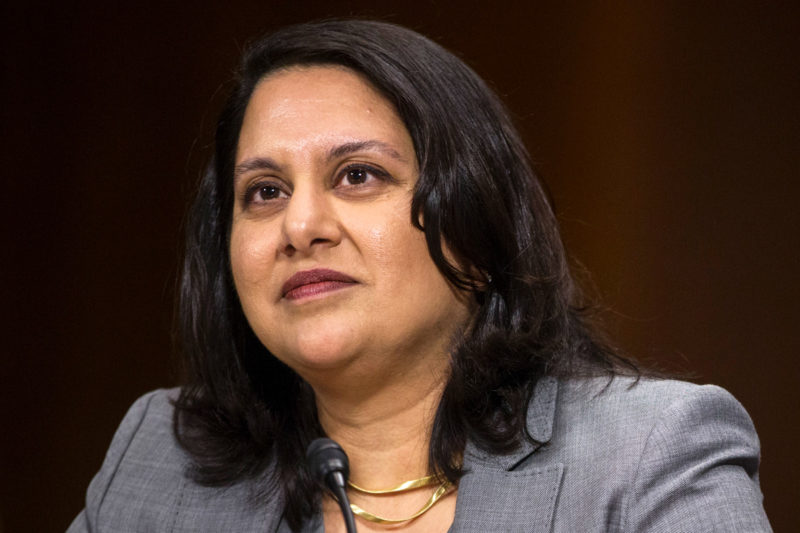Neomi Rao Was Wrong on Equal Pay, Just Like She’s Wrong for a Spot on the D.C. Circuit Court of Appeals
Last week was momentous in the fight for equal pay—despite the efforts of Neomi Rao.

Last week was momentous in the fight for equal pay. The Trump administration must now move forward with a rule requiring large employers to provide pay data broken down by race, sex, and ethnicity to the Equal Employment Opportunity Commission (EEOC). This is a huge win for workers because the first step to fighting pay inequity and closing gender and racial pay gaps is to remove the shroud of secrecy around pay, often imposed by employers.
My organization, the National Women’s Law Center, in partnership with Democracy Forward and the Labor Council for Latin American Advancement, won the case against the administration in the D.C. Federal District Court. We got this win despite the effort of Neomi Rao, administrator for the Office of Information and Regulatory Affairs (OIRA) at the Office of Management and Budget (OMB), to block the implementation of pay data collection.
In addition to being the administrator who blocked the EEOC from collecting pay data, Rao is also Trump’s nominee to replace Brett Kavanaugh on the D.C. Circuit Court of Appeals. With so much at stake when a person is nominated for a lifetime appointment as a judge, it’s critical to examine her role in blocking the collecting of critical information needed to fight the gender pay gap and pay discrimination, and to understand what it reflects about Rao’s fitness to serve as a judge on one of the most influential appellate courts in the country.
In 2016, the OMB approved an initiative requiring companies with 100 or more employees to confidentially report pay by job category, sex, race, and ethnicity. This came about after a lengthy, several-year process involving multiple opportunities for public notice and comment from stakeholders, including businesses. However, in August 2017, shortly after Rao was confirmed to lead OIRA, she issued a terse memo stopping the pay data collection, claiming that the effort “lacked practical utility” and was “unnecessarily burdensome” to businesses. She offered no evidence or analysis to support her claim.
Thankfully for women and all workers, the D.C. Federal District Court ruled against Rao and OMB last week. The central thrust of its decision is that OMB, under Rao’s leadership, violated the law when it failed to provide any analysis to support its sudden decision to stall the pay collection data. Throughout the opinion, the court found that “OMB’s assertion was unsupported by analysis.” The court also chastised the administration for appearing to rely on comments from businesses opposing the pay data collection, but ignoring comments advocating a different position—including comments in support of the pay data collection from the National Women’s Law Center, joined by 82 organizations.
Now the politics of this situation may seem simple: A new administration disagrees with the prior one, and Rao is simply a foot soldier. But that view completely ignores Rao’s central duty as administrator for OIRA: to analyze the impact of new rules at federal agencies and to consider competing viewpoints. It’s also worth noting that this is a central duty for a judge as well. She utterly failed to do that with the pay data collection. Without the court’s intervention, much harm would have been borne by workers who need the data to fight against pay discrimination.
This is not the first time that women have been on the losing end of one of Rao’s so-called analyses. Under her leadership, OIRA approved the U.S. Department of Education’s proposed changes to Title IX that would disadvantage survivors of sexual harassment, including sexual assault. And in February, Rao’s OIRA approved the U.S. Department of Health and Human Services’ final rule on the Title X family planning program, which would radically restructure the program and undermine access to birth control and other reproductive health services. Her office failed to undertake a full analysis of the rule’s economic impact on families, which it was required to do. The process surrounding the finalization of this harmful rule was so egregious that leaders of the House Energy and Commerce Committee have already requested information about irregularities, and 21 states have filed lawsuits to block the final Title IX rule.
Rao’s failings are extremely troubling as she now seeks a job promotion to become a federal judge. A federal judge is expected to conduct rigorous analysis of often complicated situations and to truly consider all the sides of an argument. This is exactly what the court found that Rao failed to do in her current position in regards to the pay data collection. Given her record, I have no faith she will suddenly do better if she were to become a judge.
Last week, the court managed to save us from Rao’s failings. But if the administration appealed the case to the D.C. Circuit Court of Appeals and if Rao were allowed to sit, there will be no one to save us from her.

